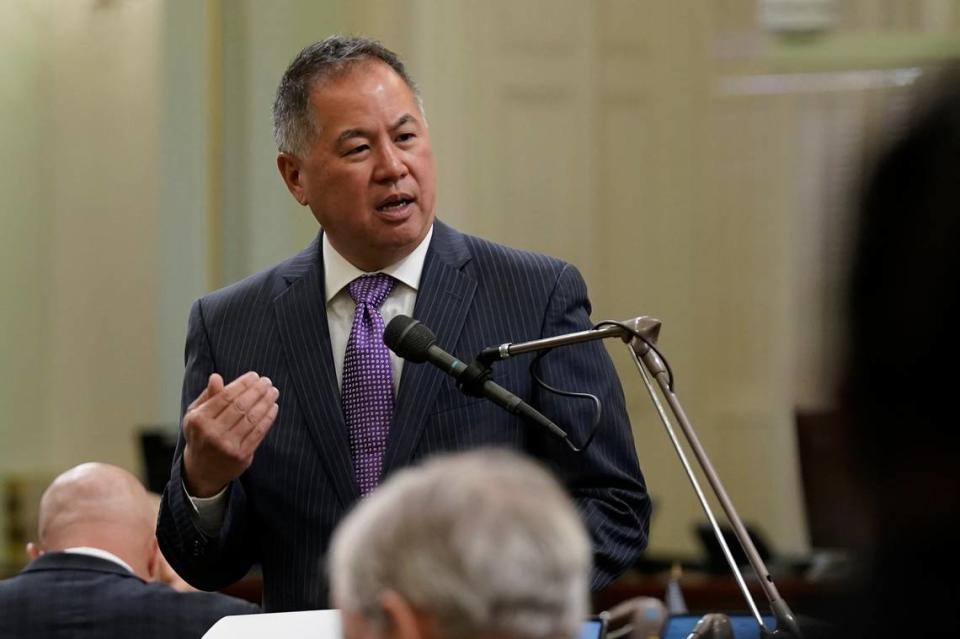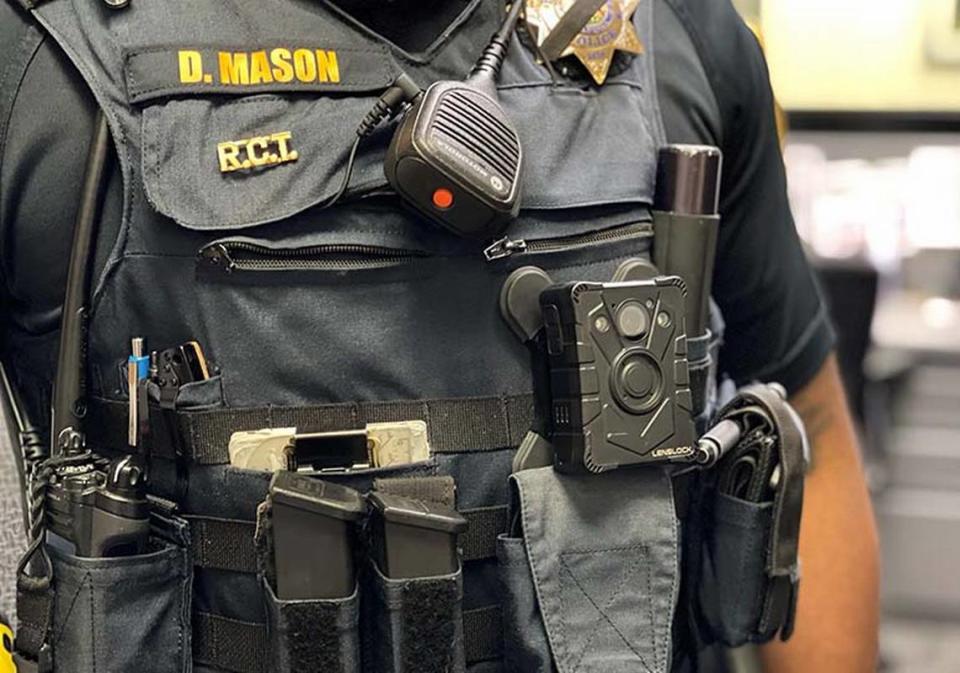‘Real-time face surveillance’ in California? ACLU, lawmaker battle over police facial recognition
- Oops!Something went wrong.Please try again later.
California legislators are grappling over how to deal with facial recognition technology in policing, leading to tensions between one-time allies on the issue.
Assemblyman Phil Ting, D-San Francisco, authored a bill that would set standards for law enforcement use of technology that captures images of people’s faces and compares them to an existing databases of photos.
The American Civil Liberties Union disagrees with this approach. While Ting thinks Assembly Bill 642 responsibly regulates this form of policing, the ACLU wants an outright ban.
The organization says setting standards for use of facial recognition would give law enforcement permission to use technology that is dangerously inaccurate, especially when identifying people of color. The ACLU is supporting a bill from Assemblywoman Lori Wilson, D-Fairfield, that bans police use of facial recognition technology in body-worn cameras through 2034.
“In the case of face surveillance, regulating it is like trying to block a cannon ball with cardboard,” said Carmen-Nicole Cox, director of government affairs for ACLU California Action, at a recent Assembly Public Safety Committee hearing.
“Regulations, no matter how well-intentioned, will not protect Californians from the harms of this technology,” she added. “But even amongst regulation-based approaches, AB 642 stands out as particularly problematic. AB 642 is not better than nothing. AB 642 invites a whole lot of bad something.”
Regulating facial recognition
Four years ago, Ting and ACLU were on the same team. They worked together to pass a three-year ban on body camera facial recognition similar to the one Wilson authored this year.
In the process of pushing his 2019 bill, Ting arranged for a demonstration of technology that incorrectly identified 26 members of the Legislature — including himself — as criminals when it compared their photos to a database of mugshots. He said facial recognition technology turns body cameras, meant for police accountability, into something different.

“Instead of a tool that is really supposed to build bridges, it now becomes a tool of surveillance,” Ting said of facial recognition and body cameras at the time.
His bill went into effect in 2020, but it expired in January after the Legislature did not pass a 2022 extension authored by Sen. Steven Bradford, D-Gardena.
Right now, there are no restrictions on California law enforcement’s use of facial recognition technology.
Most Californians likely know of the technology as a social media platform and smartphone feature. Many people use it to unlock their phones, for example.
Federal agencies and law enforcement employ facial recognition for a variety of uses. A 2021 survey from the U.S. Government Accountability Office showed 14 of 42 agencies with law enforcement officers use it for criminal investigations.
The ACLU filed a class action lawsuit in March 2020 against the facial recognition company Clearview AI, claiming it unlawfully collected data from social media and used the technology to make databases it could sell to law enforcement, according to an Assembly Public Safety Committee bill analysis. A 2021 Buzzfeed News story showed 140 California law enforcement agencies had used or tested Clearview AI’s program, the analysis said.
A handful of California cities have independently banned law enforcement from using facial recognition, the analysis said, including San Francisco, Oakland and Berkeley
Struggle to pass facial recognition ban
Ting said he declined the ACLU’s request to carry the 2022 bill because he did not think he could get it passed. He called the first ban “probably the hardest bill I’ve done in my 10-year career.”
He said he started with a 10-year sunset and had to cut it down to three years. The bill passed the Senate with 22 votes, just one more than the 21 required for approval.
“I thought that I couldn’t get a moratorium passed,” Ting said. “But I could get a very robust bill, providing significant guardrails and restrictions and standards around facial recognition technology.”
Ting’s bill requires law enforcement agencies to have a written facial recognition policy and to use the technology only when police have a reasonable suspicion a suspect has committed a felony. His measure prohibits law enforcement from using facial recognition as the only source of probable cause for a warrant affadavit, search or arrest.
Ting emphasized his bill allows police use of the technology only when the system is 98% accurate. He said he would vote for Wilson’s ban and thinks it is possible their two measures could coexist. Ting’s bill does not keep cities from prohibiting the technology and it also applies to traffic cameras, closed-circuit TV and police dashboard cameras, as well as body cameras.

ACLU pushes body camera facial recognition moratorium
But the ACLU remains strident in its opposition to any law enforcement use of the technology. They say the consequences of incorrect identification are too significant, especially in communities of color already disproportionately harmed by police violence.
Cox said during the Public Safety Committee hearing that AB 642 invites “any time, all the time, real-time face surveillance.”
“AB 642 is not better than nothing, just as drinking bleach is not better than no COVID vaccine,” she said.
The organization sees any measure regulating facial recognition in body cameras as an invitation for vendors, cities and police to “invest in and expand upon the use of this technology in a way that doesn’t exist today,” said Carlos Marquez, executive director of ACLU California Action.
“The absence of regulatory certainty ... actually creates a tentativeness within the market to proliferate, expand upon and build infrastructure around this technology,” Marquez said.
Wilson said she authored her bill because she was concerned conversations around Ting’s measure were too centered on law enforcement and didn’t include the ACLU or communities of color.
She said there are opportunities to work with Ting on creating one piece of legislation or finding a way to join their bills.
Wilson thinks it is important to hold law enforcement to a higher standard when using facial recognition technology because police have “greater power and authority.”
“There should be more restrictions,” Wilson said. “There should be more safeguards in place because the damage that they could do with a misunderstanding — it’s just absolutely unacceptable.”

